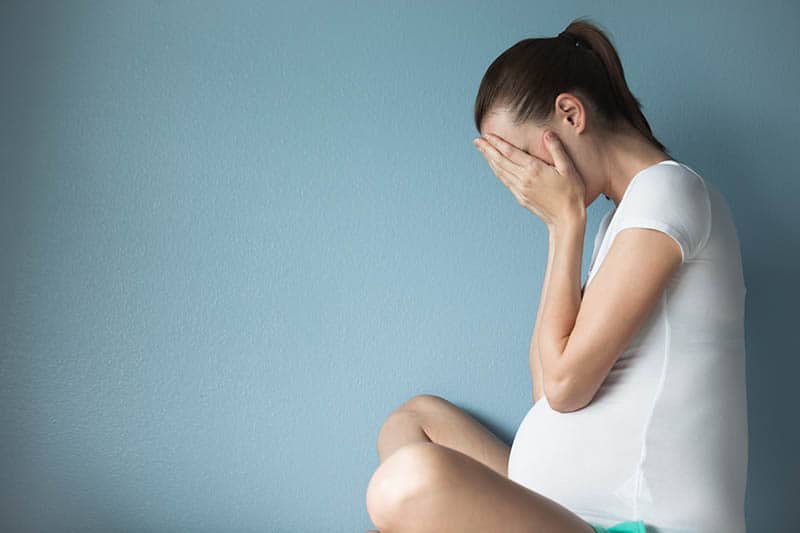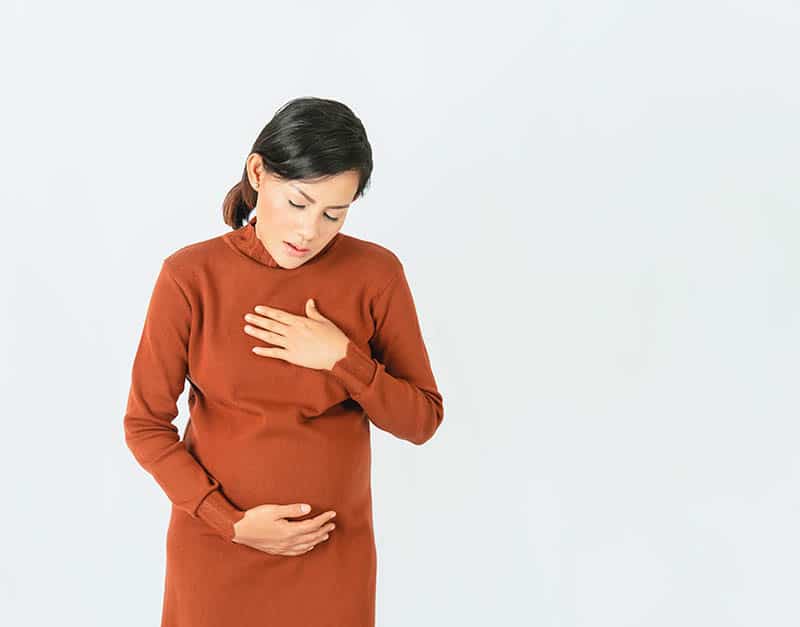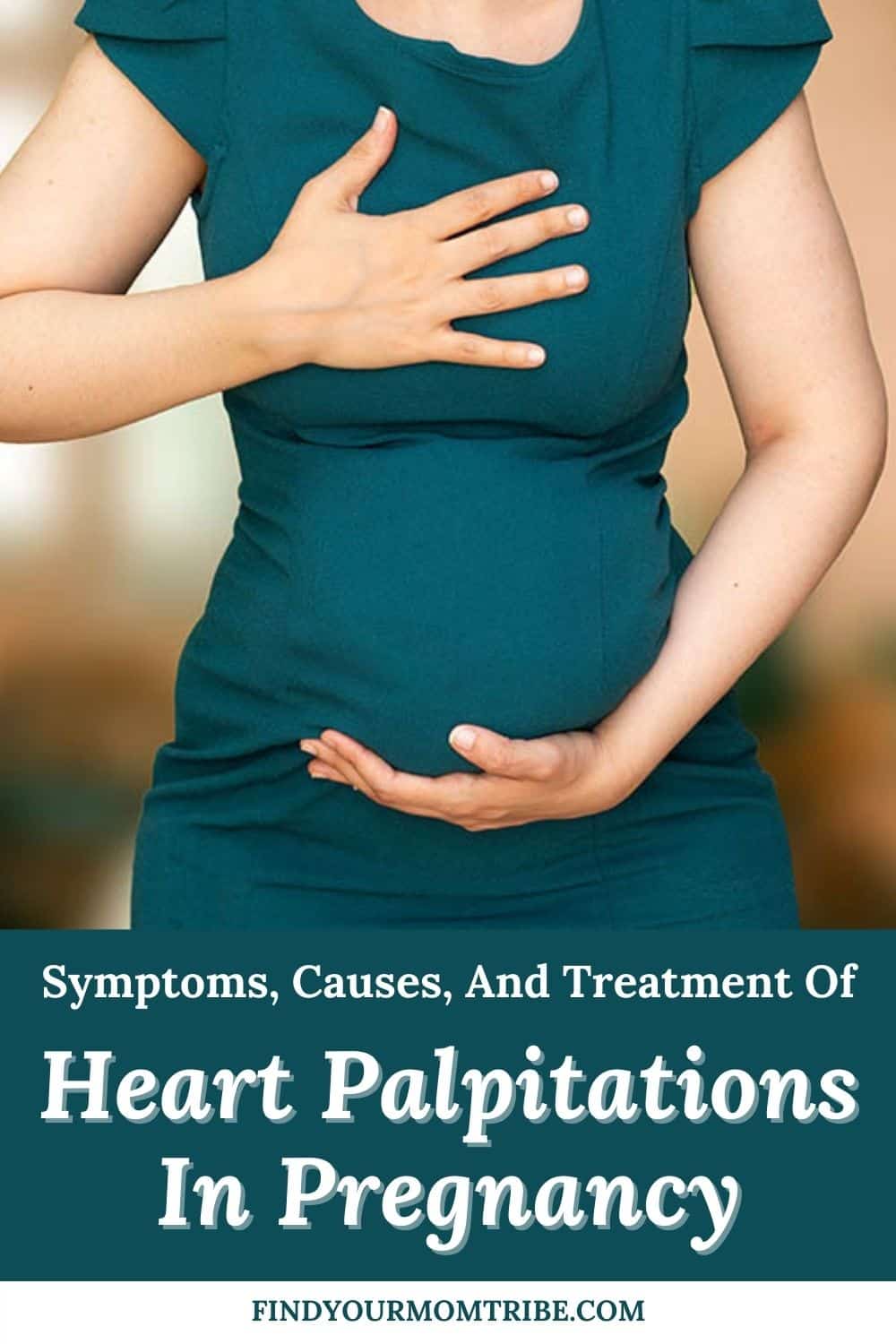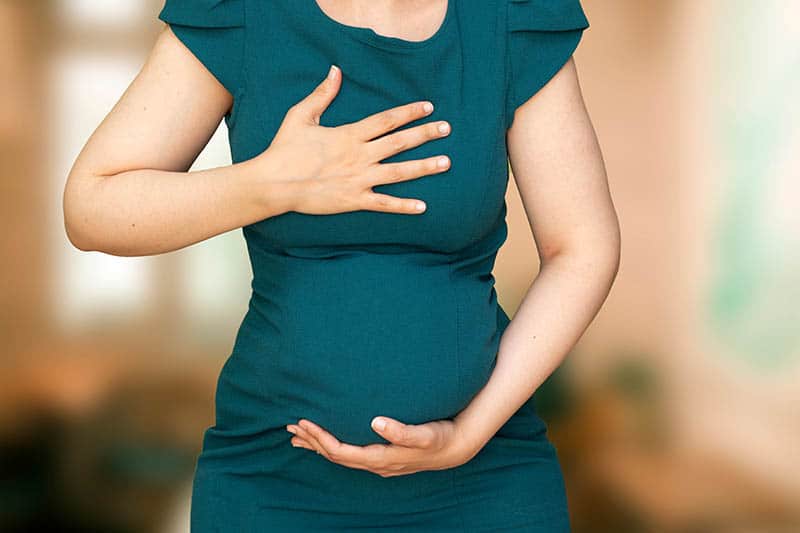Heart palpitations in pregnancy are quite common. In fact, it is something most pregnant women claim to experience at least once during their pregnancy.
Feeling heart palpitations in pregnancy can be scary, but I assure you that there is no reason to panic. In fact, here is exactly why it happens, what the symptoms are, and how to treat it.
Symptoms Of Heart Palpitations In Pregnancy

Even though not every pregnant woman will feel the exact same symptoms, here are some of the most common:
- Heart isn’t beating “properly”
- Pounding heart
- Irregular heartbeat
- Heart is skipping beats
- Rapid heart rate
- Abnormal heart rhythm
Worry not, there is nothing alarming about heart palpitations and pregnancy combined. However, if you feel dizziness, lightheadedness, shortness of breath, chest pain, or like you’re about to faint, or have low blood pressure, it’s time to seek medical help.
Causes Of Heart Palpitations In Pregnancy

1. Blood volume
A grown woman typically has a blood volume of approximately 1.3 gallons. However, it increases significantly throughout pregnancy, especially during the first and second trimester. In fact, this increase usually reaches around 45% of the entire blood volume.
Now, the heart has to pump this extra blood. Consequently, this causes a faster heart rhythm. This is completely normal and there is no need for you to be alarmed.
If your doctor suspects that your blood volume has increased more than it should have, he will likely perform a blood volume test.
2. Stress
The first and most common cause of heart palpitations during pregnancy is definitely stress. Now, you’re probably thinking that you currently have no problems in your life and that everything is just peachy.
But sometimes you’re not even aware of the stress you’re going through. This is especially true if you’re about to become a new mom for the first time ever.
As prepared as you think you are, the truth is that you don’t know what to expect And you’re never sure what’s coming next. So even if you think you’re not overthinking things, your body has a reaction to these novelties in your life.
3. Iron deficiency anemia
What a lot of people don’t know is just how dangerous iron deficiency anemia can be. It’s a condition in which your body doesn’t produce enough red blood cells that supplies oxygen to your body and that of your baby.
As you probably know from looking for prenatal supplements, a woman needs quite a bit more iron when pregnant, in order to make enough red blood cells to support the increased blood volume. But because many expecting moms are not including enough iron in their diet, iron deficiency anemia is quite common, especially during the second and third trimester.
So, how do heart palpitations come into the equation? Well, one of the symptoms of anemia is a pounding or irregular heartbeat, as your heart pumps extra blood to compensate for the lack of oxygen.
4. Medications
Even though your healthcare provider will be extra careful when prescribing any medications to you since you’re pregnant, be aware that some of the seemingly harmless drugs can affect your heart rate and cause heart palpitations. Some of them are antibiotics, asthma inhalers, cough and cold medicine.
If you notice any significant changes in your heartbeat (or any other unwanted symptoms) after taking these medications, please seek medical attention right away.
5. Anxiety and Panic Attacks
There is a significant difference between stress and anxiety. Namely, stress is a reaction in a given moment – it occurs, then goes away after a while.
However, anxiety is a condition that appears as a result of constant stress. The problem with both of them is that they have physical symptoms, including heart palpitations.
Besides the fact that pregnancy is a time of many new experiences in your life, another thing that can cause anxiety are the hormonal changes that are going on in your body.
Anxiety itself doesn’t normally have a negative impact on the fetus. However, if you develop panic attacks, they can be harmful to your unborn child.
How? Well, whenever you experience a panic attack or are severely anxious, your heart beats rapidly and your blood starts to flow more slowly throughout your body.
When this happens, there is a reduced blood flow to the baby, which is, of course, never good. In fact, it can even be the cause of premature labor.
6. Physical activity
It’s perfectly normal for you to experience irregular heart rhythm and shortness of breath whenever you engage in some kind of sport or physical activity. This is especially true if you are out of shape. You’re likely to feel your heart pounding after only a few minutes of exercising.
However, this is not a sign that you should give up on all physical activity during pregnancy. On the contrary, medical experts will advise you to keep active for as long as you feel comfortable.
Naturally, you just have to be aware of the fact that your body is changing. So, you can’t keep up with the same rhythm and pace you had before.
Keep this in mind if you were a big fan of exercising before you got pregnant, and remember to adjust your activity to the new state you’re in.

7. Hyperthyroidism
Hyperthyroidism or an overactive thyroid is a state where your thyroid produces too many hormones. This is a serious condition that needs to be treated, especially if we’re talking about maternity hyperthyroidism.
Arrhythmia and heart palpitations are among the symptoms of an overactive thyroid. When your thyroid produces too many hormones, they “quicken” every single system in the body, including your nervous system that controls the heart rate.
The bottom line is that untreated hypothyroidism can cause numerous serious problems, for both you and the fetus. So, don’t forget to talk to your doctor about any new symptoms and difficulties you might be experiencing.
8. Blood sugar level
When it comes to blood sugar levels, the number one thing all pregnant women fear is gestational diabetes. It’s a condition where your blood sugar levels drastically increase during pregnancy.
Even though this is not good, too low blood sugar levels can bring you trouble as well. In fact, they can be the cause of heart palpitations in pregnancy.
This is especially common when you’re hungry or haven’t eaten for a while. Your blood sugar level drops, which then causes your body to release adrenaline that speeds up your heartbeat.
If this is a regular occurrence, make sure you eat regularly (you should be doing it, regardless of this condition!) A simple tip is to carry a snack wherever you go, preferably something sweet.
9. Bodyweight
When you’re pregnant, your body carries extra weight, which naturally increases during the course of your pregnancy. This also can cause changes in your heart rate, especially in the third trimester of your pregnancy.
If you talk to your healthcare provider and they conclude that you’re overweight (BMI of 30 or above), it’s time to do something about it. Obesity is a serious condition during pregnancy and shouldn’t be disregarded.
It carries a high risk factor of miscarriage, gestational diabetes, and high blood pressure.
However, don’t do anything by yourself since it’s not safe to lose weight while pregnant in the conventional way. Instead, your dietitian or nutritionist will suggest a healthy diet that will help you without having any negative impact on your unborn child. Then, after you give birth, you can safely start a postpartum diet.
10. Cardiomyopathy
An irregular heartbeat is one of the first symptoms of cardiomyopathy. This is a serious disease of the heart muscle that can lead to heart failure.
When you suffer from cardiomyopathy, your heart has trouble pumping blood to the rest of your body. You don’t have to necessarily have this disease before the pregnancy – it can appear in the third trimester.
11. Congenital heart disease
Congenital heart disease is a birth defect in the heart’s structure and an abnormal heart rhythm is one of the first symptoms. Even though it carries a higher risk for the health of you and your baby, this condition doesn’t make it impossible for you to get pregnant and carry the pregnancy to term.
12. Family medical history
Genetics play a significant role in your health. Therefore, you’re more likely to experience heart palpitations during pregnancy if you have a family medical history connected with heart diseases and conditions.
It doesn’t have to be the case, but if your parents or siblings suffer from arrhythmia, there is a high risk that you might develop some heart problems or abnormalities as well.
13. Preeclampsia
Hypertension (140/90mmHg or higher) can be alarming in all stages of your life. However, you should pay special attention to it while you’re pregnant since it can be one of the signs of preeclampsia.
Preeclampsia is a condition where your blood pressure suddenly increases during pregnancy, most commonly in the third trimester. Besides having high blood pressure, this condition also impacts your other organs and can lead to kidney and liver damage.
At the end of the day, it doesn’t really matter if you have preexisting hypertension or if it has developed during pregnancy, both of these conditions lead to heart palpitations.
This is another condition you can’t and shouldn’t even try treating on your own. Instead, urgently contact your healthcare provider and your cardiologist for further information, medical advice, and treatment.
14. Smoking and drinking alcohol
Another thing that puts you at risk of heart palpitations, regardless of pregnancy, is smoking. However, it is especially dangerous while you’re carrying a baby.
Smoking and tobacco use during pregnancy can cause serious issues to a fetus, since it increases the possibility of the baby developing heart conditions.
The same goes for alcohol consumption. It’s actually pretty simple: Your heart beats faster when you drink alcohol. Consequently, heavy drinking might cause conditions such as tachycardia or arrhythmia.
Keep in mind that it’s not safe to drink alcohol during pregnancy. It is harmful to your health and your baby’s, besides increasing the risk of miscarriage or premature labor.
Treatment Of Heart Palpitations In Pregnancy

1. Hydration
The numerous benefits of drinking a sufficient amount of water during pregnancy cannot be emphasized enough. But what you probably didn’t know is that it can help you with heart palpitations as well.
Our blood contains water. Therefore, when your body gets dehydrated, your blood gets thicker and your heart has to work faster and harder to pump it through your arteries and veins. Consequently, it starts pounding.
In order to stay hydrated, you should try drinking eight to twelve glasses of water every day. If you don’t have a habit of getting in enough water, this might sound too much for you, but trust me, it’s the amount your body needs.
2. Medication
There are some underlying conditions listed above that cause heart palpitations. If you get diagnosed with one of them, there is nothing you can do about it except follow your doctor’s advice.
Contact your cardiology specialist as soon as possible, since they’ll suggest some blood tests, Holter monitor’s test, an echocardiogram, or an electrocardiogram (ECG or EKG) and give you proper treatment. Your cardiologist might also suggest a procedure called cardioversion, where electroshocks are sent to your heart. This is a perfectly safe procedure for both you and the baby.
If necessary, you’ll receive some medication that will treat your medical condition but not affect your pregnancy. Don’t reduce your doses – be sure to take your prescribed medicine diligently.
3. Relaxation techniques
It’s crucial for pregnant women to stay away from stress – and you’re no exception.
Now I know it’s easier said than done, but as mentioned earlier, your mental health has a great impact on heart health.
Fortunately, there are some techniques that can help you relax. You can try meditation or yoga specifically designed for pregnant women. It will lower your blood pressure and help you feel much calmer.
Also, whenever you feel that stress is about to take over you, do your best to control your breathing – teach yourself to slowly and rhythmically inhale and exhale.
To Wrap Up
When you’re pregnant, you become super conscious about your health. So it’s possible that you’ve been experiencing heart palpitations before, but just didn’t pay much attention to the way your heart beats until you became pregnant.
The good news is that heart palpitations in pregnancy need not be a huge source of concern. Just follow my advice regarding recognizing any other potential symptoms and following the correct course of treatment, and you’re good to go.
References:
Murray, D. (2020, September 2020). “Heart palpitations in pregnancy.” Verywell Family.
Like this post? Please share or pin it for later. You can also stay in the loop and follow us on Facebook, Instagram or Pinterest.

This post contains affiliate links. Please see our full disclosure for more info.

